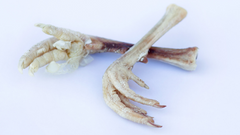Can Dogs Eat Blueberries?
Yes, dogs can eat blueberries. Not only are blueberries safe for dogs, they also serve as an excellent treat and are high in several vitamins and minerals.
Blueberries are actually a superfood for dogs and are generally a preferred treat. Adding blueberries to your dog’s diet can help keep them healthy and happy.
Benefits of Blueberries

Blueberries are naturally high in sugar, with this in mind, blueberries should be considered a "treat" for dogs. Only 10% of a dog’s diet should be in the form of treats.
When fed in moderation, blueberries can have several health benefits for dogs. Some of the benefits include:
- Contain phytochemicals that can help prevent and battle cancer and heart disease
- 85% water- great for hydration
- Low in calories
- High in fiber, calcium, phosphorous, potassium, magnesium
- High in Vitamins A, C, and K to help support the immune system
- High in antioxidants
Ways To Feed Blueberries To Dogs
You should always consult your veterinarian before adding anything, even a healthy treat like blueberries to your dog’s diet. As mentioned above, blueberries are considered a treat so be sure to factor them in as part of the 10% of the treats allowed in their diet..

That said, there are many ways to incorporate blueberries into their diet:
- Daily treat- whole berries, hand fed
- Blueberries make an excellent training treat
- Sprinkled into your dog’s food
- Frozen blueberries make a great summer snack. Be sure they are sized appropriately for your dog though as large berries may be a choking hazard to small dogs.
- Mashed
- Dried
- Pureed with strawberries and bananas
- Mixed into homemade dog treat recipes
- Added on top of raw meals or kibble
Tip: You should never feed your dog blueberries that are canned, sugared, or packaged in syrup. Many have added sweeteners that could contain xylitol, which is toxic to dogs. Organic blueberries are preferred.
Frequently Asked Questions
Q: Can blueberries be bad for dogs?
A: In rare instances, dogs may have food sensitivities. If you notice your dog seems to have an upset stomach, is vomiting, or has loose stools after eating blueberries, stop giving them blueberries.
Blueberries do naturally contain sugar, so consult your vet if your dog is diabetic.
Q: Can dogs have blueberry muffins?
A: You should avoid feeding dogs blueberry muffins. Many muffins contain nutmeg, chocolate, or sweeteners such as xylitol. Keep the muffins for yourself!
Q: Can dogs have dried blueberries?
A: Dogs can have dried blueberries. It is best to dry your own organic blueberries in a dehydrator at home. Store-bought dried blueberries sometimes contain sweeteners and added sugar.
Q: How many blueberries can my dog have?
A: The best recommendation is to consult your veterinarian before adding anything to your dog’s diet. Blueberries are considered a treat and no more than 10% of a dog’s diet should consist of treats. Generally, according to PetMD, the number of blueberries that a dog should eat per day is figured by your dog's weight:
- 2lbs-20lbs- 1-2 blueberries
- 21-30lbs- 2-3 blueberries
- 31-50lbs- 3-5 blueberries
- 51-90lbs- 5-6 blueberries
- 91+lbs- a small handful



